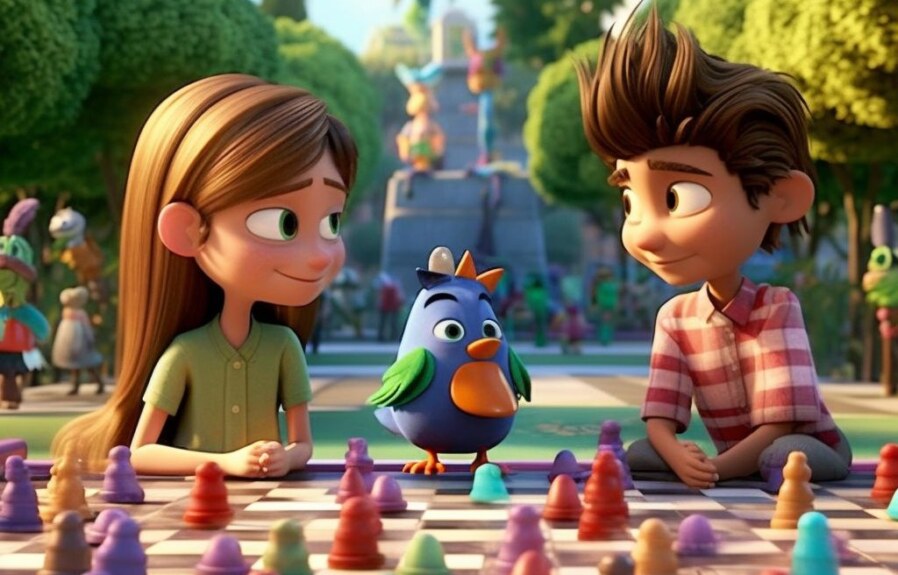If you’re looking to hone your strategic thinking skills and want to engage in a classic board game, look no further than chess. The game may seem intimidating at first, but with a bit of practice and dedication, even beginners can become experts. Whether you’re wanting to join a chess club or compete professionally, there are steps you can take to become an adept player. In this article, we’ll take a closer look at the fundamentals of chess, including tips for improving your tactics and understanding of the game. So, let’s get started and learn how to get good at chess!
1. Understanding the Basics: The Fundamentals of Chess
Before you can master the game of chess, you need to understand its basic fundamentals. Chess is a board game played by two players using 16 pieces each, following a set of rules and moves. The ultimate goal of the game is to checkmate the opponent’s king by placing it under attack with no escape or defensive moves.
Here are a few of the most important fundamentals of chess to keep in mind:
The Chessboard
The chessboard is an 8×8 grid of squares, alternating between light and dark colors. The vertical columns are called files, and the horizontal rows are called ranks. Each player starts with 16 pieces, with the white pieces starting on the first and second ranks, and the black pieces starting on the eighth and seventh ranks.
The Chess Pieces
Each player starts with one king, one queen, two rooks, two knights, two bishops, and eight pawns. Each piece has its own unique moves and abilities, and it’s important to understand how each one works before diving into more complex gameplay.
The Moves
Every chess piece can move in a different way, with some pieces able to move farther or in more directions than others. It’s essential to know the basic moves of each piece and how they interact with each other. For example, the queen is the most powerful piece on the board and can move in any direction, while the knight moves in an L-shaped pattern and can “jump” over other pieces.
The Rules
Finally, it’s crucial to understand the rules of the game, including how to check, capture, and protect your pieces. It’s also important to know how to recognize a stalemate (when one player cannot make a legal move without putting their king in check) or a draw (when neither player can achieve a checkmate). By mastering these fundamentals, you’ll be well on your way to becoming a skilled chess player.
2. Developing Strategy: How to Plan and Execute Your Moves Effectively
To be good at chess, you need to master the art of strategic planning and execution of your moves. In this section, we will discuss different strategies and tips to help you develop your skills and take your chess game to the next level.
Develop a Plan
Before you start making your moves, it’s essential to have a plan in mind. By planning your moves in advance, you can anticipate your opponent’s responses and prepare a counter-strategy. The best way to start developing a plan is by analyzing the board and identifying the strengths and weaknesses of both your pieces and your opponent’s pieces. Once you have identified these, create a plan that caters to your objectives and the nature of the game.
Control the Center
Controlling the center of the board is a crucial part of chess strategy. The four squares in the middle of the board are strategically significant as they allow you to move your pieces more efficiently and attack your opponent’s pieces. Therefore, try to occupy these squares as soon as possible to gain an advantage over your opponent.
Make Safe Moves
While executing your moves, it’s crucial to ensure the safety of your pieces. You don’t want to move your pieces into a position where they are susceptible to capture by your opponent. Always think about the potential impacts of your move before making it, and ensure that the safety of your pieces is paramount.
By implementing these strategies, you can begin developing your skills and become more proficient at executing your moves effectively. Remember, practice makes perfect, and the more you play, the more you’ll improve.
3. Analyzing Your Opponent: Reading and Reacting to Their Gameplay
In chess, knowing how to analyze your opponent is crucial to formulating winning strategies and making effective moves. It involves reading your opponent’s thinking, behavior, move preferences, strengths, and weaknesses. Below are some tips to help you analyze your opponent’s gameplay:
Study Your Opponent’s Openings
Knowing your opponent’s preferred opening moves can give you an idea of their playing style and provide insights into their potential strategy. You can use this information to formulate a counter-strategy that can give you an advantage.
For instance, if your opponent often plays the Sicilian Defense, it suggests that they are comfortable playing an aggressive and attacking game. To counter this, you can plan to play a more solid and defensive game, which can frustrate their attempts to get ahead.
Look for Patterns and Habits
Observe your opponent’s gameplay for certain patterns and habits. For example, do they always move their queen early in the game, or do they consistently advance their central pawns? Once you identify these patterns, you can use them to your advantage by either creating traps or prevent them from executing their usual strategy.
However, be careful not to become too focused on your opponent’s patterns, as this might cause you to miss potential openings or opportunities.
Anticipate Your Opponent’s Next Moves
Being able to anticipate your opponent’s next move is a skill that separates novice players from experts. This skill involves not only reading your opponent’s moves but also understanding what they are trying to achieve.
To anticipate your opponent’s next move, you must consider their game plan, analyze the board’s current position, and anticipate possible threats. Once you have a clear understanding of their next move, you can formulate a counter-move that neutralizes their strategy while also improving your position.
In conclusion, analyzing your opponent’s gameplay is an essential skill in chess, as it can help you develop winning strategies, make effective moves, and gain a competitive edge. By studying your opponent’s opening moves, looking for patterns and habits, and anticipating their next moves, you can become a more effective and successful player.
4. Practicing and Improving: Exercises and Methods to Enhance Your Chess Skills
Practicing and improving your chess skills is a crucial aspect of becoming a great player. The following exercises and methods can help you become better at chess and take your gameplay to the next level:
Tactical Drills
One of the best ways to improve your chess skills is by practicing tactical drills. These drills focus on specific maneuvers or game scenarios and can help you develop your tactical thinking. For example, you can practice identifying and executing fork, pin, skewer, and discovered attack tactics. Websites like Chess Tactics Server provide users with tactical puzzles for free.
Analyze Your Games
Another way to improve your game is to analyze your previous games. Analyzing your games can show you where you made mistakes and where you did well. This exercise can teach you more about your playing style and allow you to learn from your mistakes. Consider using software like ChessBase to record and analyze your games.
Endgame Studies
Endgame studies is an exercise where you focus on improving your endgame skills. This exercise can train you on how to calculate moves and combinations to win in specific endgame scenarios. Chessable is an online platform where you can access endgame study courses.
Blitz and Rapid Chess
Blitz and Rapid chess are quick and fast-paced games that can help you develop your speed, intuition, and decision-making skills. These games are perfect for testing your knowledge and playing with a timer. Websites like Chess.com and Chess24 offer Blitz and Rapid chess games.
By following these four exercises, you can dramatically improve your chess game and become a better player. The key is to practice consistently and keep learning from your games.
5. Embracing the Chess Community: Finding Resources and Competing with Others
In order to truly excel at chess, it’s important to not only understand the game itself but also to learn from other players. Fortunately, there are a variety of resources available to those who are looking to immerse themselves in the chess community and take their skills to the next level.
Finding Chess Communities
One of the easiest ways to get involved in the chess community is to simply look for local chess clubs or organizations in your area. These groups often host tournaments and events that allow players of all skill levels to come together, learn from one another, and compete in a friendly and supportive environment.
Additionally, there are a number of online resources that can be incredibly helpful for those who are looking to improve their chess skills, including forums and message boards where players can discuss strategy and share tips.
Competing and Learning from Others
One of the biggest benefits of joining a chess community is having the opportunity to play against and learn from other players. Whether you’re participating in a local tournament or playing online, facing off against opponents of different skill levels can help you better understand your own strengths and weaknesses as a player.
It’s important to approach each game with a mindset of learning and growth, taking note of how your opponents approach the game and what you can do differently in the future to improve your own gameplay. Don’t be afraid to ask for advice or feedback from more experienced players, as they can often provide invaluable insights that can help you take your skills to the next level.
By embracing the chess community and seeking out resources and opportunities to learn and grow, you can become a more skilled and confident player and truly master the game of chess.
People Also Ask
1. What are some tips for getting better at chess?
To get better at chess, practice regularly and study different strategies and tactics. Analyze your games and learn from your mistakes. Play against opponents who are better than you to challenge yourself.
2. How long does it take to get good at chess?
Becoming good at chess can take anywhere from a few months to several years, depending on how much time and effort you put into it. Consistent practice and study will lead to improvement over time.
3. Is it too late to learn chess?
It’s never too late to learn chess. While it may take longer for adults to develop the necessary skills and knowledge, anyone can improve with practice and dedication. Chess can also be a fun and stimulating hobby at any age.
4. What is the best way to practice chess?
The best way to practice chess is to play regularly against opponents of varying skill levels. Analyze your games and learn from your mistakes. Study different strategies and tactics through books and online resources, and practice solving chess problems and puzzles.
5. Can you get good at chess by just playing online?
Playing online chess can be a useful way to improve, but it’s important to also study different strategies and tactics and analyze your games. Online chess can also provide access to a wider variety of opponents, allowing you to challenge yourself and diversify your gameplay.
Conclusion
Ultimately, becoming good at chess requires consistent practice, study, and a willingness to learn and adapt. By challenging yourself and seeking out different opponents and resources, you can improve your gameplay and enjoy the challenges and rewards of this timeless game.



